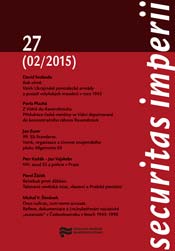Z Vídně do Ravensbrücku. Příslušnice české menšiny ve Vídni deportované do koncentračního tábora Ravensbrück
From Vienna to Ravensbrück. Members of the Czech minority in Vienna deported to the Ravensbrück concentration camp
Author(s): Pavla Plachá-ZemanováSubject(s): WW II and following years (1940 - 1949), Fascism, Nazism and WW II, Ethnic Minorities Studies
Published by: Ústav pro studium totalitních režimů
Keywords: Ravensbrück;concentration camps; deportation; Austria; Czechoslovakia; women
Summary/Abstract: More than 40 women born on Czechoslovak territory were deported from the territory of Austria to the Ravensbrück concentration in the course of WWII. They were a decidedly heterogeneous group in terms of nationality and ethnicity (including Czechs, Germans, Jews and Romanies). Likewise the Nazis’ reasons for persecuting them had various motivations (racial, ideological, ethnic, religious). In addition, assessing the women’s relationship to their native country is today very difficult. In exploring the historically established Czech resistance in Austria it is necessary to focus on Vienna and its Czech minority, which over 3% of Vienna’s citizens identified themselves as belonging to in 1939. Soon after the war broke out the Nazis proceeded to gradually eliminate Czech community life in Vienna. The resistance of the city’s Czechs was thus driven not only by ideology but also by nationality. Around 10 female members of what was referred to as the Czech section of the Communist Party of Austria were deported to Ravensbrück for their resistance activities. Its women members were predominantly recruited from a Czech sports association. Ideologically they were close to the Social Democratic Party and once the Nazi persecution began Vienna’s Czech minority began carrying out illegal activities in conjunction with the Communist Party. Their classification as “political” prisoners helped them to a certain degree to survive the cruel conditions of the concentration camp, as did their experience from the resistance, organisational ability, political views and language skills. Thanks to their cultural and ideological closeness they frequently established contact with Czech female prisoners, ties that endured after the war when the women were involved in the creation of Austria’s Ravensbrück Camp Society.
Journal: Securitas imperii
- Issue Year: 2015
- Issue No: 27
- Page Range: 44-61
- Page Count: 18
- Language: Czech

